"I am still young, I want to save my uterus." This was Ms. Liu's firm thought after she was diagnosed with endometrial cancer.
Refusing to have her uterus removed, she traveled abroad for treatment to find hope
Ms. Liu, a Malaysian, had unexplained vaginal bleeding that persisted in January 2023. She was seen locally in February and was diagnosed with endometrioid carcinoma. At only 39 years old, she felt very shocked and unbelievable: "She has always been in good health, and her family is very healthy, how did I get cancer at a young age?" As a result, she went to several hospitals for medical consultation, and the results did not change, and the doctors all recommended removal of the uterus.
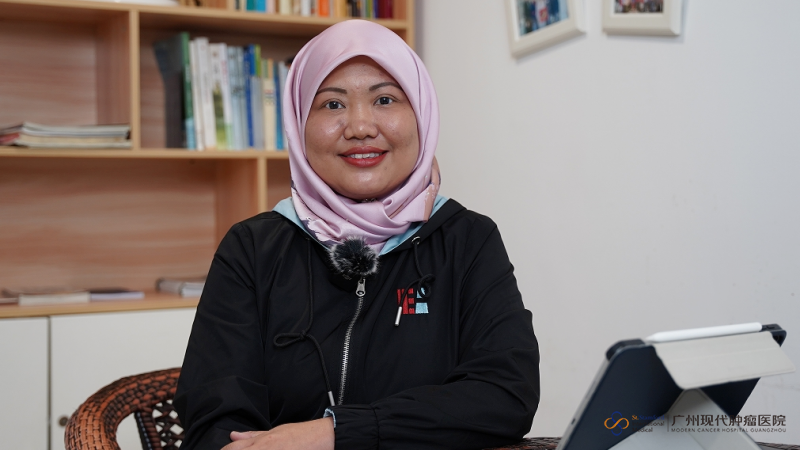
(Ms. Liu)
"I couldn't accept such a plan, I was still young and needed my uterus to bring me physical and psychological balance." Ms. Liu recalls. After that, she, who had never known about cancer before, began to read article after article about endometrial cancer, searching for related treatments and hospitals on the Internet over and over again. One day, she accidentally found minimally invasive treatment technology on the Internet, which does not need to remove the uterus, and the minimally invasive technology in St. Stamford Modern Cancer Hospital Guangzhou is very widely used and mature. She immediately decided to go abroad for treatment and her family was very supportive.
"I always believe that there is a suitable treatment for me." Ms. Liu is still very firm on her choice.
“Interventional Therapy + Seed Implantation” Leads to Successful “Weight Loss” for Endometrial Cancer Patients
On April 3, 2023, Ms. Liu came to St. Stamford Modern Cancer Hospital Guangzhou, and the doctor clarified her condition again: two tumors were seen in her uterus, one was about 7x7x8cm and the other was about 13x11x10cm, with abdominal lymphatic metastasis and liver metastasis, and she was diagnosed as stage IV endometrial cancer. Ms. Liu's enlarged abdomen is due to a massive tumor in her uterus.
Ms. Liu's chief physician, Dr. Lin, introduced: "Early-stage endometrial cancer patients are mainly treated with surgery, advocating uterine resection; if the patient has a strong desire to preserve the uterus, the doctor will choose conservative treatment according to the patient's condition; intermediate and late stage patients will be treated with comprehensive treatment such as surgery, chemotherapy and drugs in combination with the patient's condition. Ms. Liu's condition is already in the advanced stage, and she has a strong desire to preserve the uterus, she needs to resume normal work while undergoing treatment, so we chose the minimally invasive comprehensive treatment program based on interventional therapy and seed implantation, which is less traumatic and has lower toxic side effects."
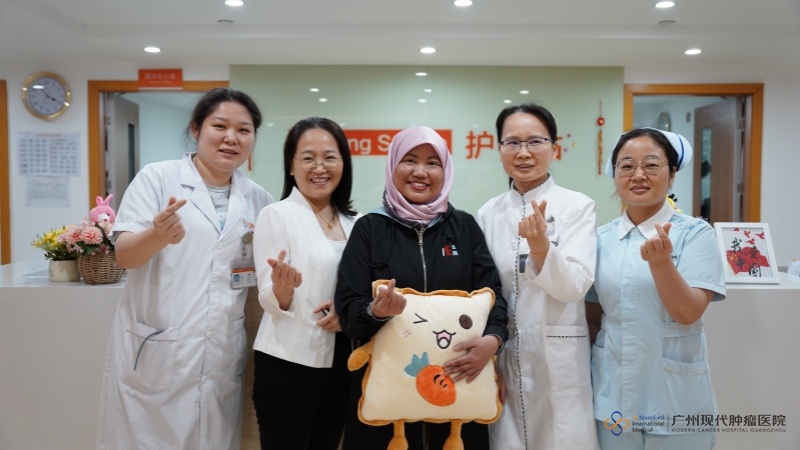
(Ms. Liu and Staffs)
It is understood that both interventional therapy and seed Implantation belong to minimally invasive tumor treatment technology.
Interventional therapy only needs to make an incision of 1-2mm, and send anti-tumor drugs to the tumor through catheter to kill the tumor directly, which has low toxicity and side effects on own cells, and has the characteristics of no incision, small trauma, fast recovery and good effect.
Seed Implantation is the direct implantation of 125 iodine particles into tumors or tissues that may be invaded by tumors to provide uninterrupted irradiation of tumor tissues and thus inactivate tumor cells, but with no or only minor damage to normal tissues.
Currently, Ms. Liu has received 6 interventional treatments and one seed Implantation in the liver. The CT report on March 14, 2024 showed that the tumor in Ms. Liu's liver was covered by the seed Implantation and had lost its activity, and the huge tumor in the uterus (13x11x10cm) had disappeared, and the abdomen was obviously slimmed down, so the treatment had achieved a preliminary victory.
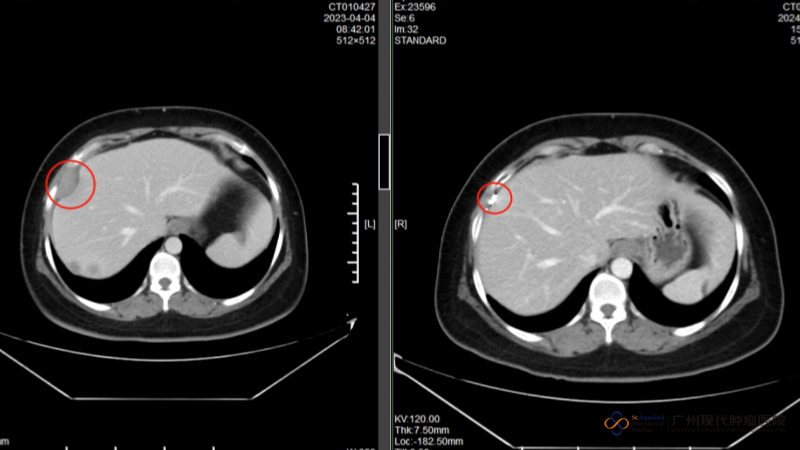
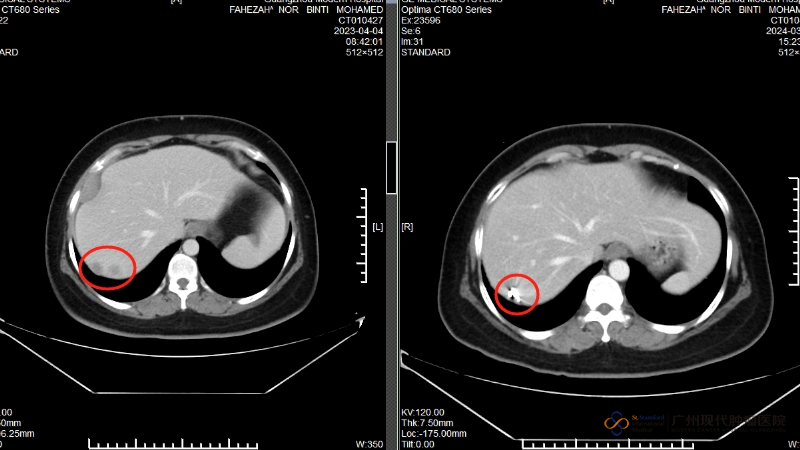
Left: CT of liver area before treatment on April 4, 2023
Right: CT of the liver after treatment on March 14, 2024
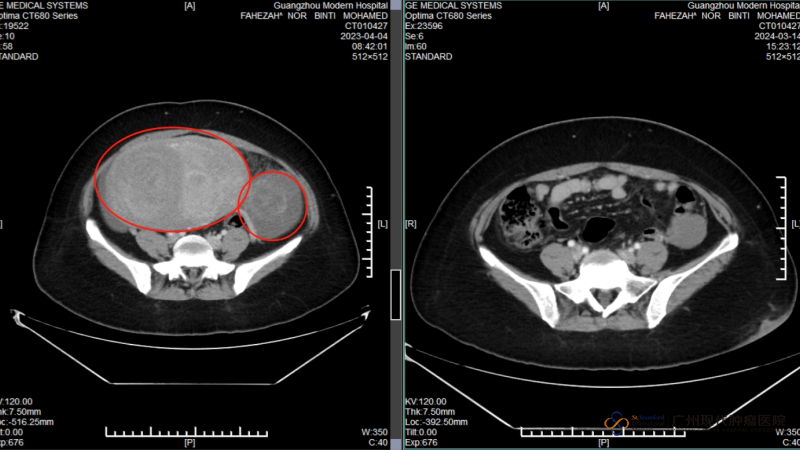
Left: CT of uterine area before treatment on April 4, 2023
Right: CT of the uterine area after treatment on March 14, 2024
Treatment comes in twists and turns, persistence is the key to victory
Recalling the treatment process, Ms. Liu said, "When I first came to the hospital, my stomach was bulging, and I always thought it was obesity, and I couldn't figure out how my tumor could be so big. I was a bit sad. The doctors always comforted me and explained the treatment to me in detail, which put me at ease a lot, so I wasn't nervous even though it was my first time undergoing interventional therapy. I trust the doctors here very much, and my treatment results have been better than ever."
The most difficult period of Ms. Liu's treatment was the period from May to December 2023. This was after she was discharged from the hospital for the second treatment because of chicken pox due to her immunity decline, which prevented her from leaving the country, and she did not receive anti-cancer treatment for more than 4 months, and her condition worsened, with bloating and her stomach was bigger than before. It was not until October that she came to St. Stamford Modern Cancer Hospital Guangzhou again.
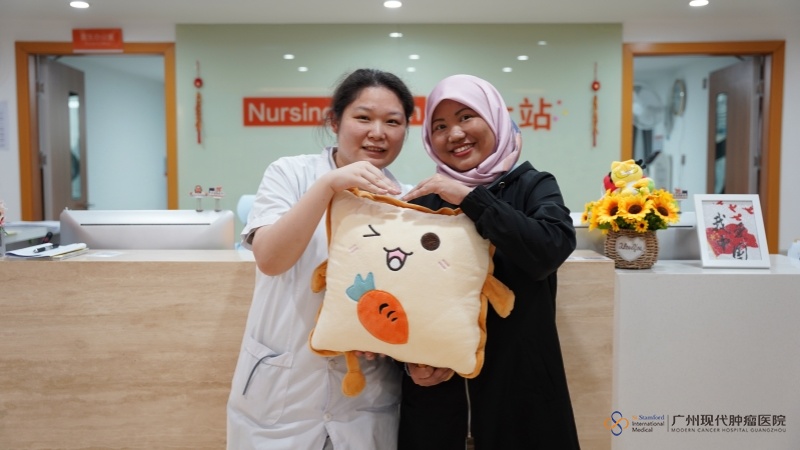
(Ms. Liu and Staff)
Fortunately, after further examination, the tumor was not enlarged, but the fluid in the uterine cavity caused the abdomen to become larger, and after pumping out the fluid, as well as active treatment, Ms. Liu's body slowly recovered. This time she stayed in the hospital for more than a month, "This period is more difficult for me, but I have accepted, just trust the doctor here, everything will pass."
She said, "During this period, I am very grateful to the medical and nursing staff of the hospital, who were dedicated to taking care of me, comforting me, and understanding me. They knew that I like to be quiet and entered my room gently and spoke softly, my bedside doctor, Dr. Ma, was always humorous and amused me. The medical staff gave me great support." She said, "There is no big psychological burden in the treatment here, and the tumor is smaller than once after treatment. When it comes to the nuisance, it is that I feel the hospital is far away and it takes a lot of time, I wish the hospital was in Malaysia and the doctors could go to my home for treatment"
Finally, she would like to tell other patients, "Keep hope, stick to the treatment, try to live hard, and be yourself even when you are sick." And she did that herself. She could return to her normal working conditions quickly after each treatment, and her persistence was rewarded with a victory. Now no one will think she is a patient, she is still the gentle and temperamental president of university admissions.
*Surgery, in addition to the appropriate chemotherapy and radiotherapy, are effective in treating early cancer, but certain patients in late stage of cancer may not be tolerate surgery well as they can be relatively weak. A combination of carefully planned minimally invasive therapy, chemotherapy or radiotherapy can effectively reduce the side effects and discomfort of treatment and may help patient get better efficacy.













 viber
viber